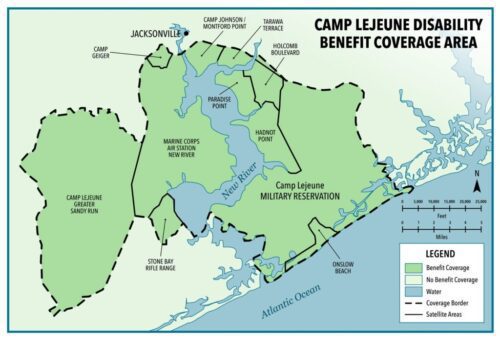Join VFW representatives and legal counsel from BMBF and CWCS March 19, 2:00 pm ET to discuss Camp Lejeune Groundwater Litigation and live Q/A
The webinar, which will be held live at the VFW Facebook Page, will feature BMBF Partner Phil Federico, attorney Guy Smith of Green Wilson Crow & Smith, Attorney and Veteran Jason Johns, VFW Director of National Veterans Services Michael Figlioli, and VFW General Counsel John Muckelbauer. Panelists will speak to the current state of the litigation, and answer questions on the claims filing process and other issues.
Camp Lejeune is a United States Marine Corps Base Camp in Jacksonville, North Carolina, that is now known to be the site of an environmental and public health disaster.
For over three decades, beginning in the 1950s, chemicals from leaking underground storage tanks, industrial area spills, improper waste disposal, and a nearby dry cleaner contaminated the drinking water at Camp Lejeune with toxic chemicals.
Anyone who served, lived, or worked at Camp Lejeune between 1953-1987 may have been exposed to dangerous chemicals linked to serious illnesses such as cancer.
On August 2nd, 2022, the PACT Act passed Congress, granting veterans and their families the right to seek justice for health conditions caused by toxic water contamination at Camp Lejeune.
At BMBFC, we have an experienced environmental litigation team with a proven track record of achieving justice for families and communities ravaged by the health impacts of toxic contamination. We are here to listen, guide, and lead clients through these cases, never losing sight of the benefit we are hired to achieve.
Chemical Contamination Of Drinking Water
In the early 1980s, multiple sources of drinking water at Camp Lejeune were found to contain cancer-causing chemicals. However, according to organizations like the Agency for Toxic Substances and Disease Registry, the contamination started decades earlier, in the early 1950s.
There have been allegations that the government knew about the contamination for decades but failed to take action to protect the community.
Two water treatment plants that supplied family homes, schools, and buildings on the base with water – Tarawa Terrace Treatment Plant and Hadnot Point Treatment Plant –were contaminated with chemicals such as benzene, trichloroethylene (TCE), perchloroethylene (PCE), and vinyl chloride (VC).
According to the Centers for Disease Control and Prevention, those volatile organic compounds, or VOCs, were found in the water far exceeding the maximum “safe” level.
Health Impacts Of Contamination
It is well established that frequent or large exposures to pollutant VOCs in drinking water are linked to several serious health conditions, including cancer, neurological damage, and other illnesses.
And tragically, pregnant women who are exposed to these toxic chemicals are more likely to suffer miscarriages and the babies born are more likely to have birth defects.
People who were exposed to contaminated water during their time serving or living at Camp Lejeune may have developed:
- Adult leukemia,
- Aplastic anemia and other myelodysplastic syndromes,
- Bladder cancer,
- Kidney cancer,
- Liver cancer,
- Multiple myeloma,
- Non-Hodgkin’s lymphoma,
- Parkinson’s disease,
- Bladder cancer,
- Breast cancer,
- Esophageal cancer,
- Female infertility,
- Hepatic steatosis,
- Kidney cancer,
- Leukemia,
- Lung cancer,
- Miscarriage,
- Multiple myeloma,
- Myelodysplastic syndromes,
- Neurobehavioral effects,
- Non-Hodgkin’s lymphoma,
- Renal toxicity, and
- Scleroderma.
Why Now?

In the past, the Veterans Administration denied many claims from those who may have been harmed by exposure to the contaminated water at Camp Lejeune. When reviewing claims, the VA may have used physicians who were not specialists and had minimal background on issues stemming from Camp Lejeune to evaluate these claims.
Victims have also been denied justice because of a North Carolina law that prevented toxic contamination victims from bringing a lawsuit more than 10 years after pollution takes place.
After years of suffering because of this stunning environmental contamination, there is now hope in sight for Camp Lejeune victims. In 2021, a group of dedicated citizens helped to introduce the Camp Lejeune Justice Act to Congress.
The legislation proposed eliminating the legal barriers that Marine veterans and their families face from the uniquely unfair application of the North Carolina statute in federal courts.
The bipartisan Camp Lejeune Justice Act of 2022 was rolled into the PACT Act, which was passed by Congress on August 2nd, 2022.
The passage of this bill now allows service members and their families to seek justice by removing barriers that have stopped those harmed from filing claims.
What we do for you
At BMBFC, we are focused on achieving justice on behalf of veterans and their families who were harmed while serving our country, and we are proud to offer the direct personal attention of our attorneys with a highly individualized focus on your matters.
What sets us apart is a team of lawyers with significant experience fighting for communities that have been ravaged by water contamination. Our environmental law attorneys – comprised of experts in the environment, water, engineering, and health fields – has gotten justice for families and communities who live every day with the health impacts of toxic contamination.
Our focus on a core group of practice areas has allowed us to develop considerable expertise in our fields and the ability to offer our clients an intense and highly individualized focus on their matters.
Our clients receive the direct personal attention of our environmental law attorneys, and we pride ourselves on our responsiveness and accessibility.
How To Seek Justice
If you or someone you know lived or worked at Camp Lejeune for at least 30 days between 1953-1987 and would like to contact our experienced team of environmental law lawyers to help you with a free case evaluation, please complete the form below.
